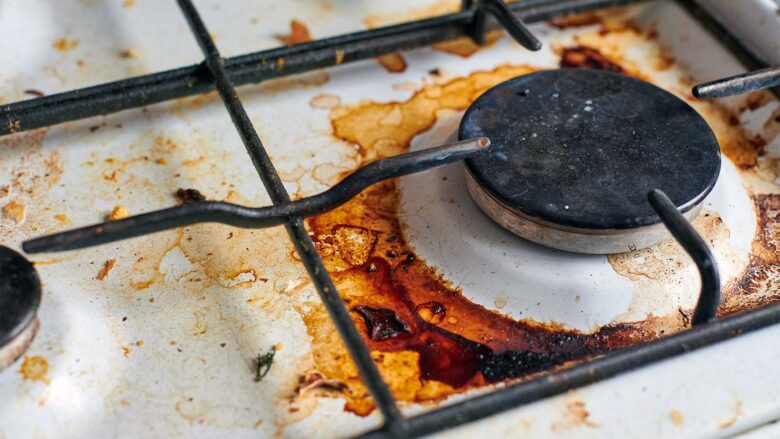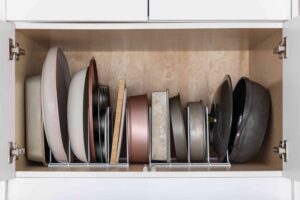Removing grease from your kitchen can be difficult, especially if it has been in the kitchen for a long time. However, if you know what to do, you can get the job done quickly and leave your kitchen spotless. This complete guide will show you many different ways to easily remove kitchen grease, from natural home remedies to store-bought cleaners, so you can discover what works best for you.
1. Understanding Kitchen Grease
Before you start cleaning, it’s important to understand what kitchen grease is and why it’s so difficult to remove. Kitchen grease consists of oil, grease, and food particles that stick to surfaces. Once it oxidizes and mixes with dust and other particles in the air, it becomes sticky and difficult to remove.
2. Daily Cleaning Habits
Sticking to a daily cleaning routine can help prevent grease buildup:
- Wipe surfaces regularly: To prevent grease from settling, wipe kitchen surfaces with a damp cloth after cooking.
- Use Cooking Splatter Screens: These screens prevent the surface from getting grease stains while you cook.
3. Natural Cleaning Products
Natural cleaning products are safe, environmentally friendly, and often just as effective as store-bought cleaning products.
- Lemon and water solution: Add equal parts lemon juice and water to a spray bottle. Spray the cleaner on the greasy area and wait a few minutes. Then wipe it with a clean cloth.
- Baking soda paste: Mix baking soda and water to form a paste. Apply the paste to the oily areas, let it sit for a few minutes, then gently scrub with a soft brush or sponge and rinse.
- Lemon juice and water: The acid in lemons helps break down oils. Greasy surfaces can be sprayed and wiped with lemon juice mixed with water.
4. Commercial Cleaners
Commercial cleaners are more effective at removing more stubborn oil stains. Make sure you follow the instructions on the package and test a small area first to ensure you don’t damage the surface.
- Degreasers: Degreasers are specifically designed to remove grease in the kitchen and work extremely well. Look for items that won’t damage kitchen surfaces.
- Dish soap and hot water: Strong dish soap can cut through grease when mixed with hot water. Apply with a sponge or cloth, scrub, and then rinse.
5. Steam Cleaning
Using high heat and pressure to break down grease without the use of chemicals is an effective way to remove grease.
- Handheld steam cleaners: These tools can be used to remove grease from areas such as stoves, countertops, and cabinets.
6. Tips for Tough Areas
Certain areas in the kitchen may need more attention than others, such as the stove and extractor hood, where grease can build up more quickly.
- Stovetop: For stubborn stains on the stove, use a degreaser or baking soda paste. Remove the bones from the stove and wash them separately.
- Vent Hood: For extractor hoods, remove the filter and soak it in hot water with dishwashing liquid or degreaser. Use a cleaning agent or vinegar solution on the extractor hood.
7. Preventing Grease Buildup
Preventing grease buildup is important to make cleaning easier.
- Use airflow: To help remove grease particles, always open a window or use kitchen ventilation while cooking.
- Cover food while cooking: Keep lids on pots and pans to prevent food splatters and grease build-up.
- Regular cleaning schedule: Develop a regular cleaning schedule to remove grease before it gets worse.
Conclusion
Removing kitchen grease is not difficult. By understanding how grease works and using precautions and good cleaning practices, you can easily keep your kitchen clean and grease-free. Whether you use natural remedies or store-bought cleaners, the most important thing is to be consistent and take immediate action to stop oil buildup. Following these tips will help you keep your kitchen spotless.
FAQs
1. What are the best natural ways to remove grease in your kitchen?
One of the best natural ways to remove grease from your kitchen is by mixing vinegar and water. Because vinegar is acidic, it breaks down grease and oil, making it easier to wipe away. For tougher stains, mix baking soda and water into a paste.
2. Can lemon be used to remove kitchen grease?
Yes, lemon is a great natural way to remove grease in the kitchen. The citric acid in lemon juice can remove grease. Mix equal parts lemon juice and water in a spray bottle to create a natural cleaner that works well.
3. How often should I clean my kitchen surfaces to prevent grease build-up?
To prevent grease build-up, it is best to clean the kitchen every day, especially after cooking. Clean things like stoves and range hoods more thoroughly at least once a month.
4. Can all kitchen surfaces be cleaned with a store-bought degreaser?
Store-bought degreasers can be used, but they may not work on all surfaces. Before using the entire product, read the label and test it on a small, hidden area of the surface.
5. What should I do if natural cleaners do not remove grease?
If natural cleaners don’t work, you may need to use a store-bought, heavy-duty degreaser that targets cooking grease. As a safety measure, follow the instructions that come with the product and wear gloves.
6. How to clean kitchen cabinets without damaging the finish?
Start by using a mild cleaning solution, such as dish soap and water, on your kitchen cabinets. If that doesn’t work, try vinegar and water. Never use aggressive cleaning agents on large surfaces in the first instance. Instead, test a small area first with a soft cloth.


